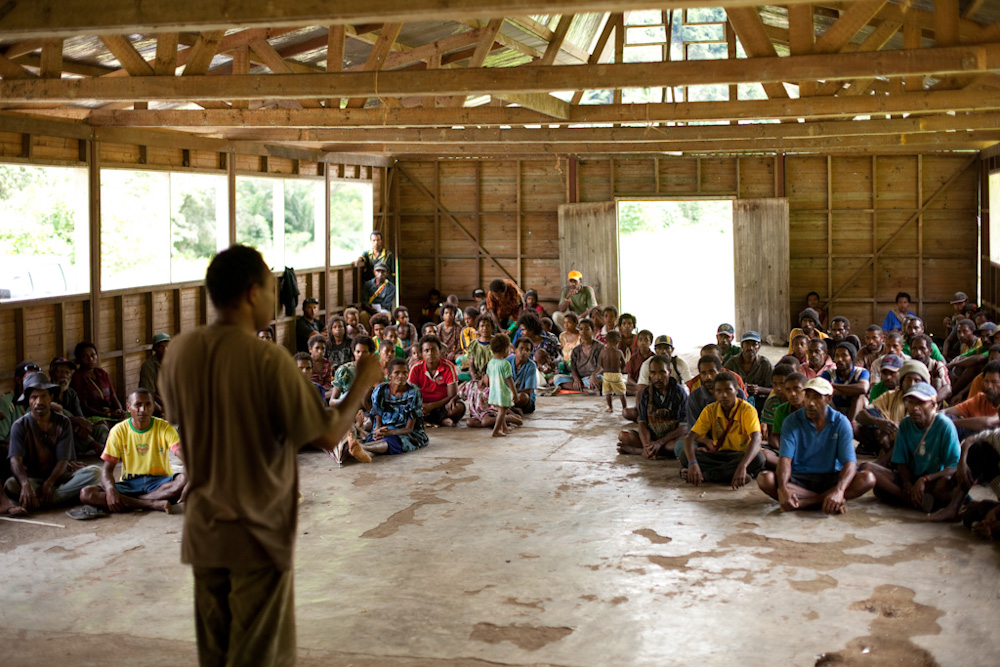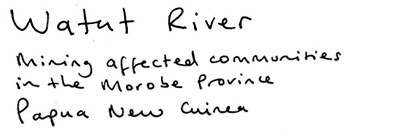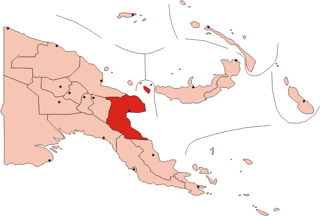
Photo: Jessie Boylan / MPI
Despite often being labelled as a “mountain of gold floating in a sea of oil” Papua New Guinea, or rather, many Papua New Guineans, have yet to experience the benefits promised by mining and other extractive industries. With poor education standards, increasing infant mortality and declining services all contributing to a static Human Development Indicator, Papua New Guineans have a right to question the assumption that ‘mining brings development’.
The background to this project lies not just in the recent impacts from mining along the Watut River, but in the history of mining in PNG that spans the Bulolo Gold Fields, the crisis that started at Panguna leaving 16-20,000 dead, the destruction of the Ok Tedi River and the disposal of mine waste into the ocean at Lihir, Misima and Ramu. It is a history marked by conflict between economic systems, beliefs and customs where mining profits are expatriated or leave little lasting community benefit to compensate for significant environmental impacts and ongoing social and cultural dislocation.
All too often – mineral exploitation is pushed and promoted by those with the most to gain; multinational companies, Government and corporate elites and, sometimes, local leaders. For these select few, the benefits from mining outweigh the impacts. For others, their experience is a loss of self determination and transitory benefits complicated by external processes and scales of operation that overwhelm their culturally specific, often localised, knowledge and experience.
Increasing community awareness and expectations means that the tri-fecta of proponents can no longer ignore or overrule communities with impunity. While there has been some slow and incremental reform in PNG’s mining industry in recent decades, it is now time to change the mining development paradigm to ensure that ‘mining really does bring development’ for all Papua New Guineans.
While industry, government and investors could once have hidden behind their own ignorance of the impact of mining; this is no longer possible. While the concepts of free, prior and informed consent [FPIC] and social license to operate [SLO] do not hold all the answers, they have and are changing the paradigm where the evaluation of the risks and benefits of mining occurs with the full and active participation of affected communities.
The question that remains is whether the Hidden Valley and Wafi-Golpu mines situated along the Watut River Valey will follow the historical and destructive pattern of large-scale industrial mining development in PNG or whether it can set a new standard.
This project takes neither a pro nor anti-mining perspective: instead it supports the decision-making authority of the affected communities, the Morobe Province, Local and National Government, and the people of PNG. Rather, our contribution is to assist those concerned about mining to understand the impacts and make informed decisions about whether, where, how and when mining should occur.
This site is hosted by the Mineral Policy Institute.
The Mineral Policy Institute [MPI] is an international civil society organisation with a volunteer board representing members from across the world. Operating from Australia we focus on assisting communities affected by specific mining projects and on achieving industry reform through improvements to policy, law and practice.
With a strong emphasis on self-determination and subsidiarity (the basis for free prior and informed consent), MPI undertakes a supportive role to assist mining affected communities to protect their rights and secure solutions to community concerns. Unfortunately, while mining disproportionately impacts the developing world, the decisions that govern these projects are made and need to be influenced in the developed world. MPI has the expertise, the experience and the networks to assist communities and to access the many mining companies based in Australia [also US, UK, South Africa and Canada] and their investors from around world.
We are guided by a vision of a just and sustainable mineral cycle where human rights are protected, impacts dramatically reduced and mineral/fuel efficiency and reuse is paramount. While we believe that minerals/fuel are central to the quality of human life today, the benefits of the current minerals systems are greatly skewed to a relatively small global elite. MPI plays a key role in addressing this paradox… to increase the equitable distribution of the benefits while decreasing the social injustices and environmental impacts of the mineral/fuel system.
If you want to know more about us please look at mpi.org.au or Sign up for the Mineral Policy Institute’s Mining Monitor Newsletter
Contact: Charles Roche
Executive Director, Mineral Policy Institute
M: (+61) 0450 901 714
E: charles.roche[at]mpi.org.au
PO Box 6043
Girrawheen WA 6064
AUSTRALIA
Contact:


